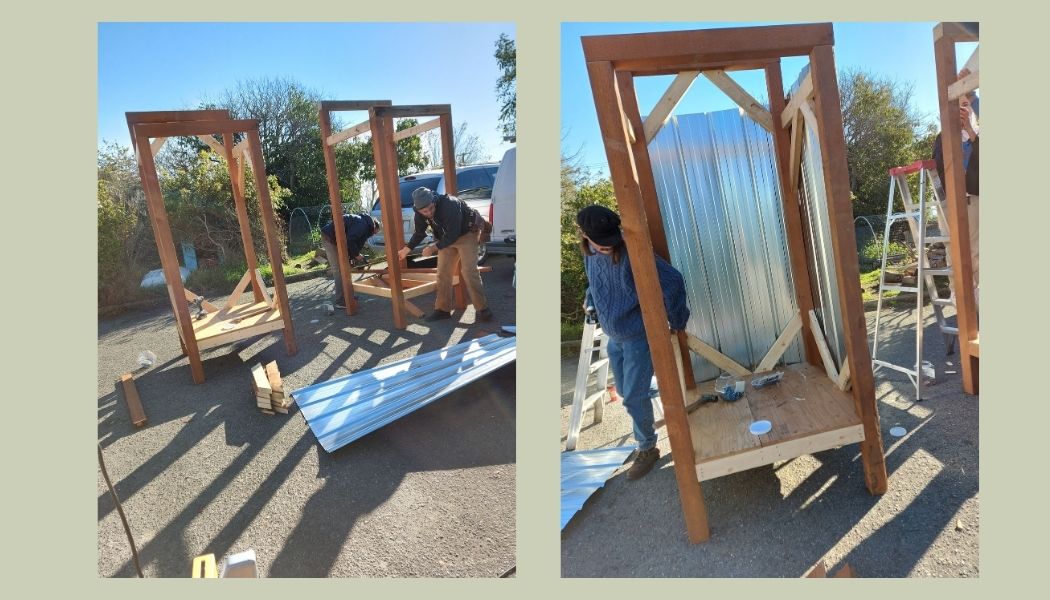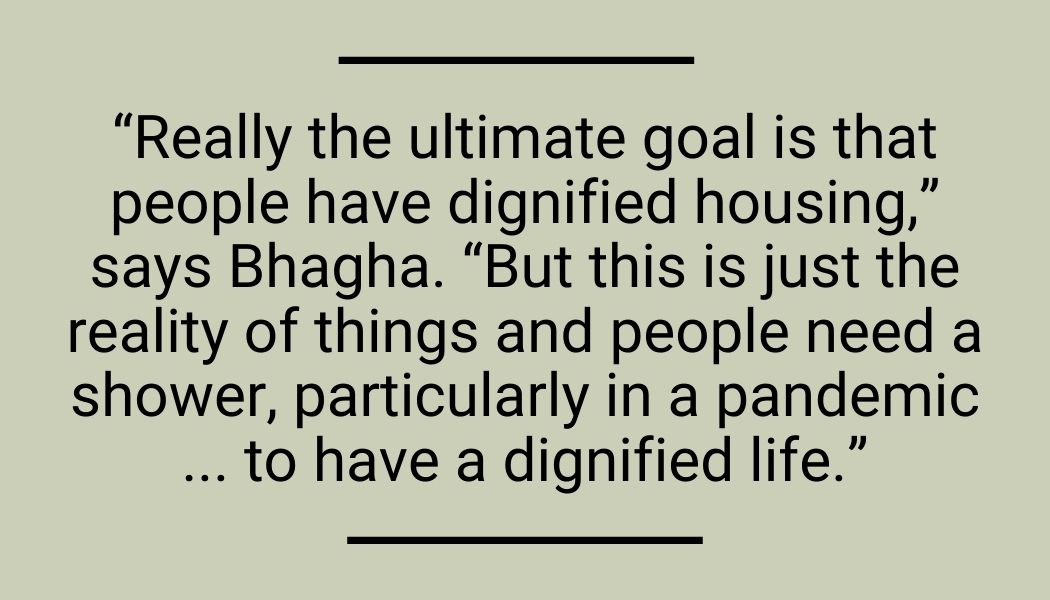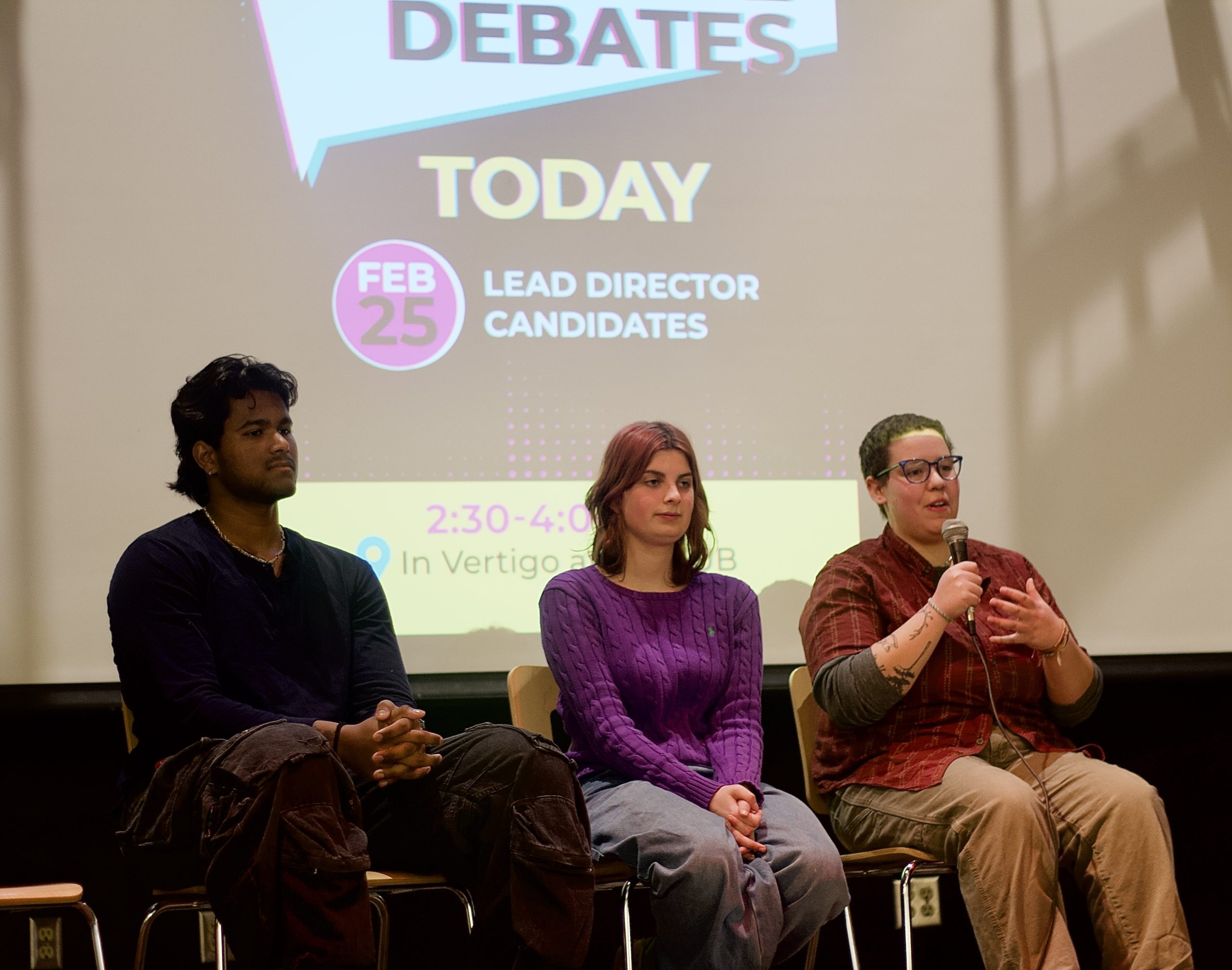The two Beacon Hill Park showers will be installed in time for winter

The chill in the air serves as a reminder that winter is fast approaching. On a crisp October day, a half-dozen or so members of the Greater Victoria community are hard at work hammering nails and two-by-fours on to a wooden frame. Despite the importance of the job they are doing, the sound of jokes and laughter fills the air. Eventually, the shape of a shower stall can be made out and the workers take a break, content with their efforts.
With winter around the corner, members of Victoria’s unhoused community need a warm shower more than ever. More than 250 people are currently sheltering in Victoria’s Beacon Hill Park with little access to cleaning facilities.
In August, a group of community members working on the Gidimet’en tiny house build were approached by Rose Henry, an Indigenous matriarch and homeless activist, about building Beacon Hill Park showers. On Oct. 24, they built two showers, with the hope of helping unhoused people keep clean and warm this winter.
Since showers are needed across the city, those participating in the build say they hope to work with aid organizations to build a mobile shower. For now, organizers hope that these showers will help people sheltering in Beacon Hill better navigate the coming months.
The need for showers
Henry has been leading weekly meetings for people sheltering in Beacon Hill Park for around seven months now. Members of Victoria’s Indigenous and unhoused communities call her Grandma Rose.
At every meeting, a mix of aid workers, community members, and the unhoused gather in a circle. Once everyone present is part of the circle, Henry passes around a feather and gives those who wish to speak a chance to do so. For many of the unhoused, this serves as a chance to air their grievances and express their needs to the assembled aid workers, volunteers, and municipal officials. Outside of securing stable housing, which is still an ongoing process, the most expressed need was the installation of Beacon Hill Park showers.
Related: Life in a piece of fabric: people living in Beacon Hill Park relocate, face harassment
While the city has set up a handwashing station for those in the park, there is still no shower access close by. The nearest showers available are at Our Place Society on Pandora. If people want to take a shower, they have to leave their belongings — exposing them to theft.

With little response from the city or established aid organizations, Henry reached out to a group of community members led by carpenter Craig Turney, who has past experience building tiny houses for Indigenous communities. She asked them whether they would be willing to fundraise and build showers for the unhoused. Without hesitation, they took up the call.
Community building
For Turney, helping others is a key part of his job. Besides owning his own business, Turney is a secretary and volunteer coordinator of the Victoria Tool Library. The Tool Library provides rental tools and expertise to community members.
Turney is also a frequent volunteer with the Tiny House Warriors, who build houses for Indigenous communities fighting to reclaim their land. Many of the volunteers have little to no building experience, so it’s often up to Turney to show them the ropes.
“A lot of it’s breaking down a complex task into smaller, manageable chunks,” says Turney. “It’s also just a nice thing of spreading skill in the community.”
The building of the showers took place over two weekends in mid-October at UVic sessional instructor Seb Bonet’s house. About six volunteers helped out with the project, doing tasks ranging from cutting wooden beams to hammering in the steel backing. By the afternoon of Oct. 24, the showers had been completed and awaited relocation to Beacon Hill Park.
Before any building could be done, however, the group needed to fundraise. A clothing drive at the end of September helped them reach their goal. Volunteer Ella Martindale, a master’s student in anthropology at UVic, said the drive was “super successful” and raised almost $3 000.
Although Martindale says the group is happy with how much they were able to fundraise, another volunteer, Dr. Bilal Bhaga, who also works for the Kool-Aid society as a family medicine resident, says that the group had hoped to raise more in order to pay for their initial idea of a mobile shower unit. Bhagha says that the issue with the stationary showers they built is that they are limited in use to one community and can be easily dismantled by bylaw officers over drainage and fire safety concerns.
“Unfortunately, when there are permanent structures at any of the parks they get quickly taken down by bylaw, our thought was how to work around that in a way that our work isn’t for nothing,” says Bhagha .
Martindale and Bhagha both noted that if they did build a mobile shower, they would also have to find an aid organization willing to be responsible for the unit as their group does not have the capacity. Between the time needed to fundraise and find an aid organization to partner with, the group decided to put off the idea of a mobile shower in favour of building stationary showers in time for winter.
“People who are unhoused and living in the different parks are saying ‘we need showers now,’” says Bhagha. “So we’ve been sprung into action quicker to build short-term showers that are still with hot water and still well-built but won’t necessarily be able to trailer.”
Turney says that the showers will be complete once hot water tanks are delivered and installed.
The group hopes to build similar showers for the unhoused at Central Park in the near future. Showers have also recently been installed by the City of Victoria at Royal Athletic Park, which is closer to Central Park than it is to Beacon Hill.
Bhagha emphasizes that the group is not affiliated with any organizations and their capacity is limited. He hopes that they will be able to partner with an organization in order to complete their ultimate goal of a mobile shower unit.
“Our intention with this build has been as a group that is not an official organization but rather a grassroots group of community members that has certain skills and is recognizing a need,” he says. “Our issue is that we don’t have the long-term capacity to bring the showers, if it’s on a trailer to the different places and run a program.”
Bhagha recognizes that the ultimate goal for people is housing. However, with a shortage of housing available, the group is working to address the needs of the unhoused community as best they can.
“Really the ultimate goal is that people have dignified housing,” says Bhagha. “But this is just the reality of things and people need a shower, particularly in a pandemic … to have a dignified life.”







